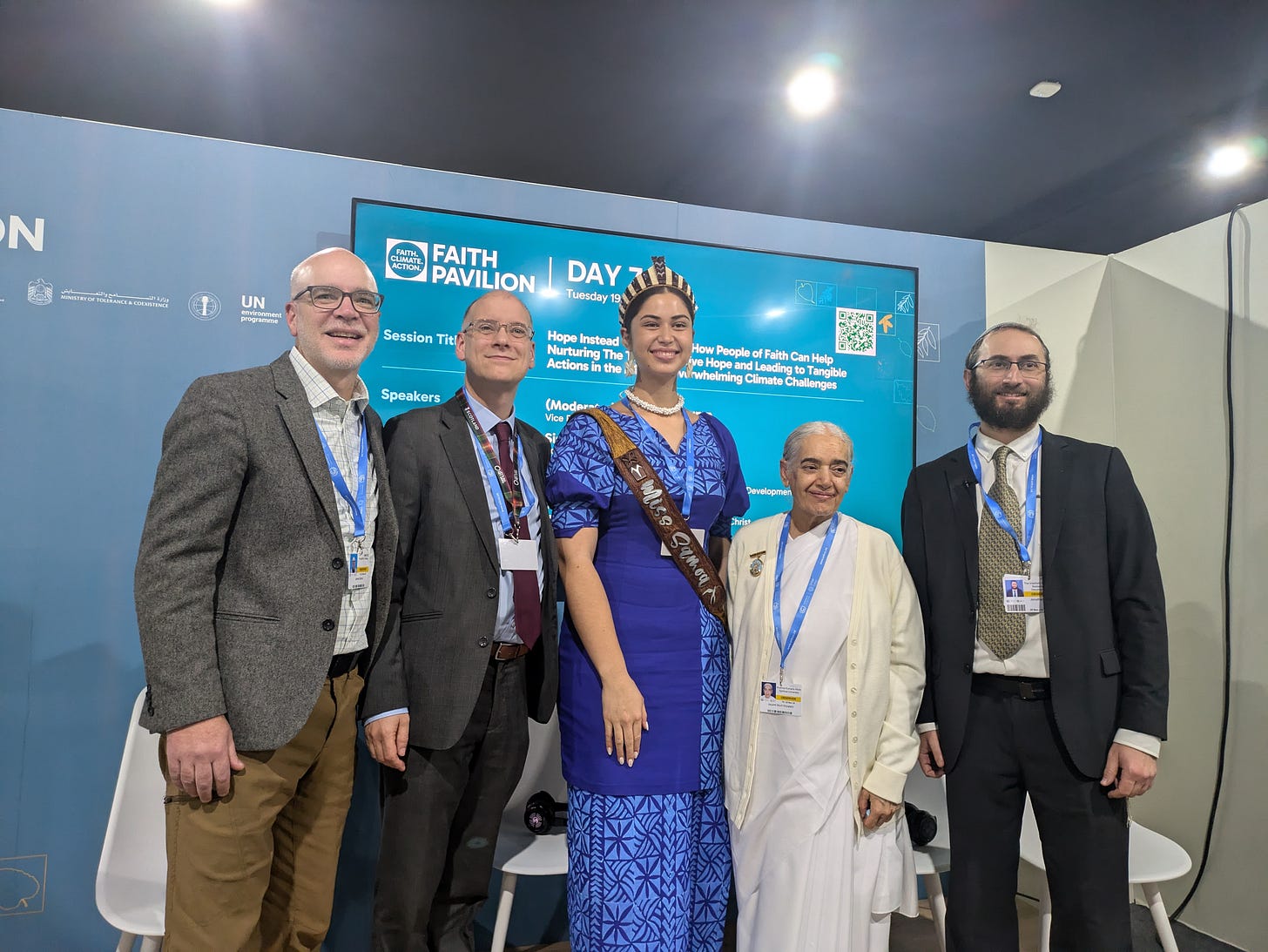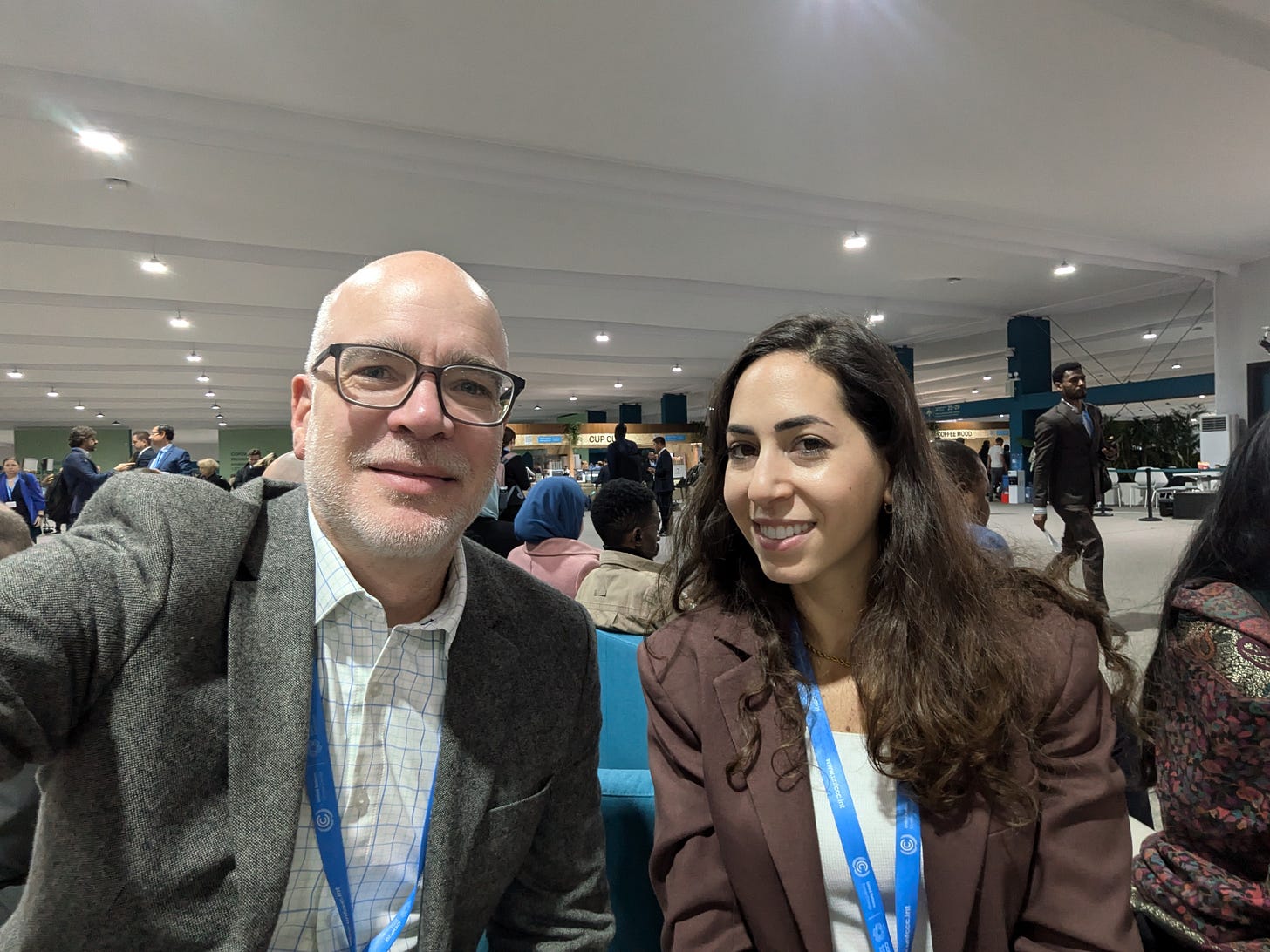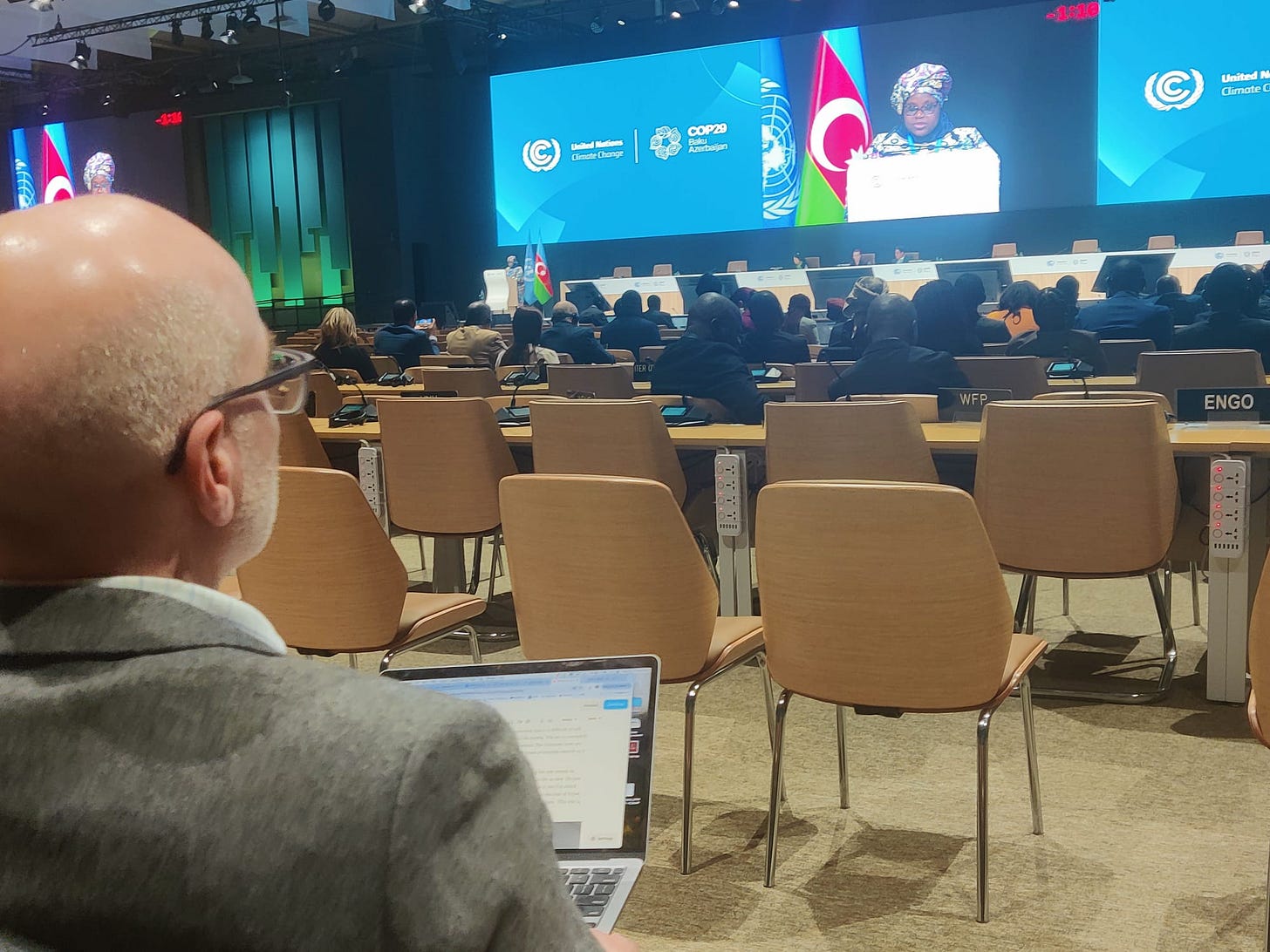This morning was the session I moderated at the Faith Pavilion. Back a couple of months ago, the CCOP leadership said we might have an opportunity to propose a session and wondered if anyone had any ideas. For the last several years, I had been talking to people on the podcast quite a bit about hope, and I’ve kept trying to tease out the difference between hope and optimism. My general thesis is that it is possible to be hopeful even if you’re not terribly optimistic, though of course there is a kind of philosopher’s trick going there where you define the problem away. (In the middle of the pandemic, I wrote an article about this for the BioLogos website if you’re interested in a deeper dive.) So for the Faith Pavilion, I thought it would be fun to explore whether in times such as these, religious traditions can help us cultivate hope. And because the Faith Pavilion is an interfaith entity (and entirely funded by a Muslim group), we thought it would be good to have a panel with representatives of other religious traditions.
So here we are: a rabbi from Jerusalem on one end, and me on the other. Next to me is another of the CCOP leaders who is climate scientist working with the mission organization YWAM in Scotland, and next to the rabbi is an Indian woman who is part of the Brahma Kumaris movement of Eastern mysticism and spirituality. And in the middle is the currently reigning Miss Samoa, who broke all the stereotypes about beauty pageant queens, with her engaging and subtle intellect (she too is a Christian). I gave a little introduction then we went through the panel a couple of times hearing about their work and what their faith tradition has to say about hope. The general consensus was that hope is more of an inward and active thing, rather than an emotion that happens to us dependent on external circumstances.
Then in the middle of the session I split up the audience into small groups and had them discuss the question of hope vs. optimism for about 10 minutes and then report back to the group. The most interesting of these comments for me was an indigenous woman who asked whether different people have different capacities for hope. I thought that was really interesting, and wondered how much the differences that have been imposed on us by our genetics and cultures affect our abilities to have hope. After that the panelists went around a couple more times with further reflections and advice.
I don’t know that such events do much in the grand scheme of the COP and what needs to be accomplished here. There are a hundred of them going on at any given time (maybe more?). But just like when I used to give a conference paper in one of the breakout sessions at an academic conference where only a handful of people would attend, the greater impact is on those who prepare and participate. It was a really meaningful experience for me (and I will put it on my CV!).
After the session I was pretty exhausted and went to find somewhere comfortable to sit. That happened to be next to a kiosk selling $10 slices of cheesecake. I decided that I had earned one. After some rejuvenation of my glucose levels, I went toward the plenary hall for the big afternoon session. But they wouldn’t let us in yet, so I sat again on a bench. A woman sat down next to me whose badge said she was part of the official delegation for the State of Palestine. I took a chance to see if she’d be willing to speak a bit with the likes of me. She was willing and we had a moving conversation for about ten minutes — during most of which I had a serious lump in my throat and excess water in my eyes. I said I was sorry about devastation of her people because of the war and wondered if there were noticeable ways in which the situation has been made worse because of climate change now. She answered that it is difficult to tell what is climate right now because of all the effects of the bombs. The air is constantly filled with noxious fumes and there is pollution everywhere. We don’t know what is climate and what is the war. But it is becoming winter and the weather will make things more difficult. The fortunate ones are now living in tents while the less fortunate bear the full brunt of winter while living and sleeping outside.
I asked if her work and conversations here at COP29 are giving her any reason to hope for the future. She paused a bit and then answered, “Hope is a little too ambitious for us now. Do you see the news in the US about what is happening?” Yes I have seen it, but I’m afraid most of the Christians in the US assume they are supposed to be on the side of Israel. She responded quickly with some measured agitation, “I am a Christian! There are many Palestinian Christians. This war is not about religion. They are trying to eradicate us as people.”
I told her that Colin and I are here trying to tell the stories of people from around the world who are being impacted by climate change now. She said, “Please tell my story too. I am Olga. And please know that climate change is going to make what is already an unbearable situation even worse.”
After talking to Olga, I wiped my eyes dry and went into the big plenary hall for the “high level consultation”. This is a session where all countries get to make a speech. There is a timer going and the speeches are supposed to be limited to three minutes. The developed countries get up and brag about the efforts they are making in green energy and routinely go a minute or so over time. A gong sounds at the end of three minutes, but they ignore it. It kind of makes me upset to see them up there grandstanding and strutting with their three or four minutes of fame. But this is not the real work of the COP — that’s going on in the small rooms I reported on yesterday.
The difference with the representatives of the developing nations is remarkable. They get the same chance to stand in front of everyone and speak for three minutes, but they don’t strut. They are desperate and implore the rest of the world to do something about the disasters they continually face and had little responsibility for causing. For example, a minister from from St. Kitts and Nevis spoke very eloquently. She said, “Our fishermen’s nets are empty, our hoes till no soil that can turn back the famine, our rains never stop. But there is hope here in Baku if the leaders will act with courage. Let us be seized by a desire for meaningful change, not accepting of the status quo of incrementalism.”
The representative from Chad got up and spoke in French, and everyone reached for the headsets that connect you to the interpreters. He said, “we are the front line of this crisis, fully exposed to the effects of climate change. 2024 was unprecedented: 119 of our 125 departments [that’s what the translator said… are those states or districts?] were flooded. More than 10% of our population was displaced. 217,000 homes were destroyed; 70,000 livestock died, and over 500 human lives were lost. The Sudan crisis to the east results in immigrants who have no other place to go. The difficulties in Libya to the north challenge our national security. We are a fragile state, and we cannot wait any longer. We call for a special financial mechanism dedicated to fragile nations. Loss and Damage was a major step forward, but we need swift implementation. It would be remiss of me to conclude without calling for the world to save Lake Chad.” That was a paraphrase, because he went over the three minute limit by four minutes and thirty-eight seconds… and I didn’t mind at all.
The minister of Eritrea also went over time by three minutes and thirty-three seconds. After recounting some of the disasters his country is facing, he concluded, “our people are left with no option but to hope against hope.”
That was a powerful day. Maybe the “real work” of the COP isn’t in speeches like these, or the conversations I had in the hallway, or in the session I led at the Faith Pavilion. But I think those experiences did some work on me.






What a powerful day for you! So touching that you met Olga and had that conversation with her! Lord have mercy!